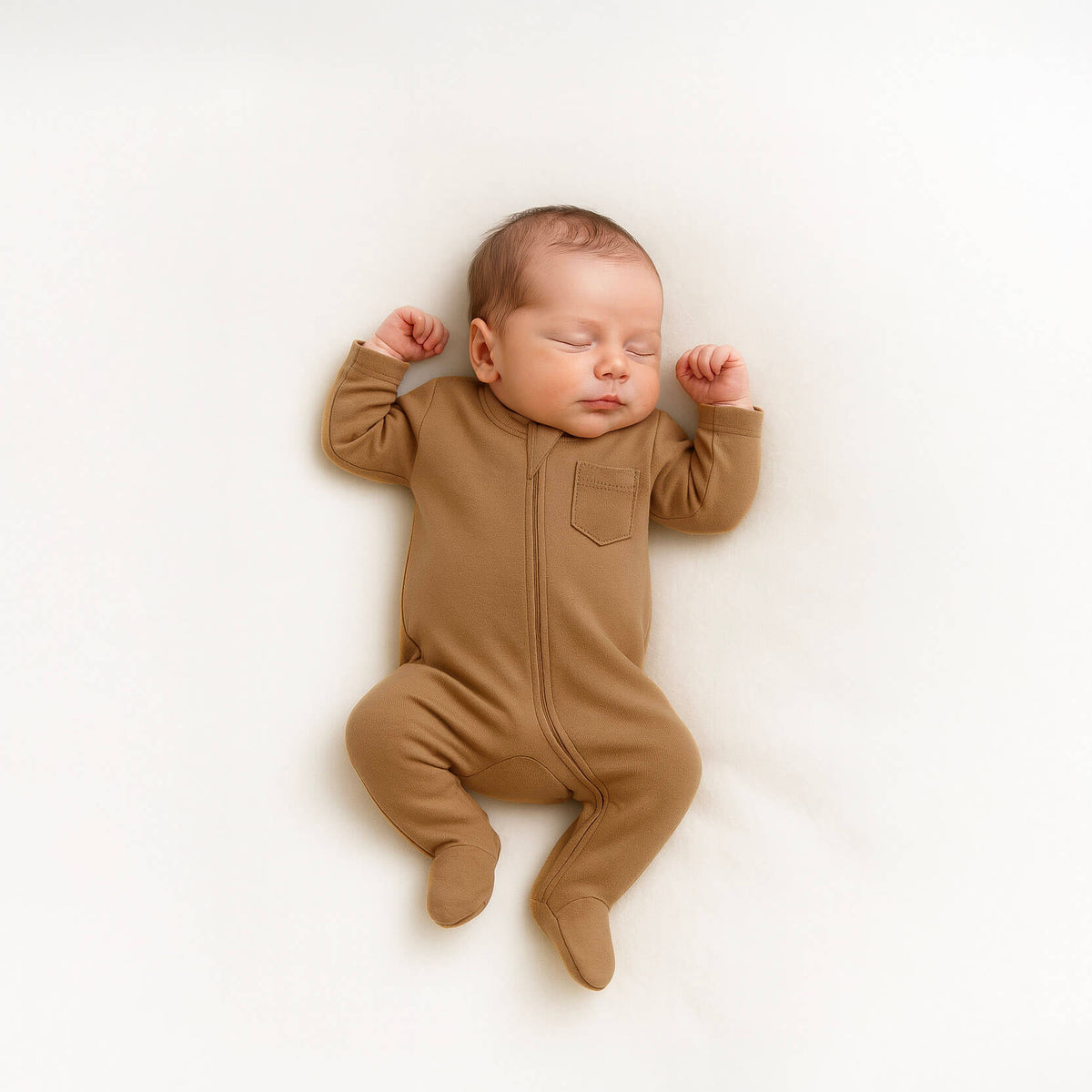
TENCEL™ Lyocell vs Bamboo Viscose for Baby Sleepwear: What Every Parent Should Know
|
Time to read 4 min
Have an account?
Log in to check out faster.
|
Time to read 4 min
Table of contents
Not all soft baby pajamas are created equal. If your little one has ever woken up sweaty or fussy even in the cutest sleeper it might be more than a growth spurt or teething. Fabric plays a huge role in your baby’s comfort, skin health and sleep quality.
Two popular options on the market are TENCEL™ Lyocell and bamboo viscose. Both are marketed as buttery‑soft and breathable, but do they hold up under midnight diaper changes, spit‑ups and wash day? Let’s dive into what makes each fabric tick so you can choose the best sleepwear for your baby’s delicate skin and your busy routine.
Both TENCEL™ Lyocell and bamboo viscose feel luxuriously soft against your baby’s skin. However, softness alone doesn’t guarantee a restful night.
TENCEL™ Lyocell fibers are smooth to the touch and have high tenacity (strength) among cellulosic fibers. This unique structure supports a natural dry feeling through moisture control, meaning TENCEL™ pulls moisture away from the skin and releases it back into the air. The result? Your little one stays dry, comfy and cool, especially if they run warm or sweat easily (1).
Bamboo viscose, while soft and drapey, is less breathable. Its absorbent fibers can trap warmth and humidity, leading to overheating when layered in cooler weather. Many parents love bamboo’s buttery feel, but they notice that it may hold onto moisture longer than expected. If your baby is a sweaty sleeper or prone to heat rashes, bamboo viscose may not be the best choice.
Mama tip: When shopping for baby sleepwear, look for phrases like “moisture‑wicking” and “breathable” rather than just “soft.” TENCEL™ Lyocell checks all those boxes and ensures all‑night comfort.
Soft fabrics that pill after a few washes aren’t worth the money. Here’s how each fiber performs:
TENCEL™ Lyocell is naturally strong even when wet, and has high tenacity. It holds its shape and resists pilling, so garments look and feel like new longer. It’s ideal for items that get heavy wear, like footies and gowns.
Bamboo viscose often pills and thins over time, especially when blended with cheaper fibers or washed in hot water. This can be frustrating when you’re investing in premium pajamas.
To prolong the life of any sleepwear, wash items inside‑out on cold, use a mild fragrance‑free detergent and skip fabric softener. Lay flat or tumble dry low.
Delicate baby skin deserves the gentlest fabric possible.
TENCEL™ Lyocell is hypoallergenic and naturally antibacterial. Its smooth fibers reduce friction and trap less heat, making it ideal for babies with eczema, dry patches or extra‑sensitive skin. TENCEL™ products are certified to OEKO‑TEX® Standard 100 Class I (the strictest level for infant safety).
Bamboo viscose, though soft, doesn’t wick moisture as effectively and can feel clingy when damp. Dampness can aggravate irritation or lead to heat rashes. Bamboo fabrics without closed‑loop production may also retain trace chemicals from processing, which could irritate sensitive skin.
Eco‑minded parents often gravitate toward bamboo because bamboo plants grow quickly without pesticides. However, turning bamboo into fabric requires heavy chemical processing. Most bamboo viscose is made with sodium hydroxide and carbon disulfide. Unless these solvents are captured and reused, they can harm workers and the environment.
TENCEL™ Lyocell, by contrast, is manufactured in a closed‑loop system. According to Lenzing (the maker of TENCEL™ fibers), wood pulp is dissolved and spun into fibers, and more than 99.8 % of the solvent is recovered and fed back into the loop. This near‑zero‑waste process drastically reduces water and chemical pollution. TENCEL™ fibers are also made from responsibly sourced wood and carry EU Ecolabel certifications for their low environmental impact.
From the very beginning, we searched for a fabric that would feel like a hug and hold up like a pro. TENCEL™ Lyocell gave us everything we wanted:
Buttery‑soft touch parents (and babies) adore.
Cooling comfort for year‑round sleep.
Hypoallergenic peace of mind for delicate skin.
An eco‑conscious footprint that aligns with our values as parents and business owners.
You’ll find TENCEL™ in nearly every piece we design, from zippered footies with fold‑over mittens to sleep sacks that grow with your baby. It’s what helps Cuddle Sprouts stand apart, because your baby deserves the softest, cleanest start.
Choosing the right fabric for your baby’s sleepwear may seem like a small decision, but it can make a big difference in how well your little one sleeps, how calm their skin feels and how long their outfits last. By opting for TENCEL™ Lyocell, you’re giving your baby breathable comfort, hypoallergenic safety and a sustainable future. That’s exactly what we’re here for.
If you’re ready to upgrade your little one’s wardrobe, explore our TENCEL™ collection of convertible footies, 1.0 TOG sleep sacks and knotted gowns. We promise your baby (and Mother Nature) will thank you.
Yes. TENCEL’s smooth, moisture‑wicking fibers reduce friction and support a natural dry feeling, which helps prevent irritation. Many pediatric dermatologists recommend TENCEL™ for babies prone to eczema or dry patches.
Bamboo plants grow quickly without pesticides, but the conversion into viscose typically involves chemical solvents (e.g., sodium hydroxide and carbon disulfide). Unless produced in a closed‑loop system, traces of these solvents may remain in the final fabric.
TENCEL™ Lyocell has higher tensile strength than bamboo viscose and resists pilling. Bamboo viscose tends to pill and stretch over time, especially with frequent washing.
TENCEL™ Lyocell is produced in a closed‑loop process that recovers 99.8 % of the solvent, resulting in minimal waste and lower environmental impact. Its wood pulp comes from responsibly managed forests, and the fibers are certified to stringent environmental standards.
Resources
TENCEL™ Lyocell and Modal fibers